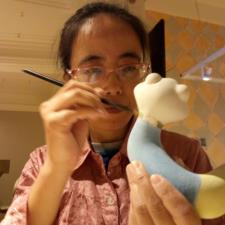1,755 Answered Questions for the topic grammar
Grammar Chinese
04/10/19
what are common contractions in classical chinese?
I am searching for contractions in classical Chinese.
for example:
而已 ---contracts-to---> 耳.
Liebe Grüsse an die süsse Teresa!
Which homophones trip up most people?
I believe it is some possessive words such as its and their, as opposed to the contraction it's, which is short for "it is" or "it has" and the adverb "there" or the contraction, "they're" (they are).
more
Grammar Chinese
04/09/19
What does 劲抽 mean?
I was looking at a Chinese poster for the new Suicide Squad movie:
http://screenrant.com/suicide-squad-posters-international-joker/
I saw the phrase '各有各劲抽.' What does this mean? 'Each one has...
more
Grammar Chinese
04/09/19
Complement of result:完 or 好?
I‘m currently learning how to form the complement of result and what are the translations of some common compound verbs. My book makes this examples: • 看完=to finish watching • 写好=to finish writing...
more
Grammar Chinese
04/09/19
How is 就 (jiù) used?
Pimsleur's Mandarin course teaches "I'm leaving very early tomorrow morning" as:
> 我明天早上很早就走 (wŏ míngtiān zăoshàng hĕn zăo jiù zŏu)
It says that `就 (jiù)` doesn't have a corresponding meaning...
more
Grammar Chinese
04/08/19
Difference between 月 and 月份 for the noun "A month"?
So, I'm trying to figure out what is a better way to simply translate "An important month". For example if I wanted to talk about the month of Ramadan I originally said
"斋月是穆斯林非常重要的一个月“
but a...
more
Grammar Chinese
04/08/19
我一字一字地学习汉语 OR 我一个字一个字地学习汉语?
Which is the correct use of this grammar pattern?
我一字一字地学习汉语。
我一个字一个字地学习汉语。
The first one feels correct to me. The pattern is:
一{MW,N}一{MW,N} + 地 + V
Grammar Chinese
04/07/19
What is the grammar of "用餐曅請隨手整理桌面 座位有限請勿休憩估用"?
In a cafeteria, there is a sign which presumably means something like, "There are a limited number of seats, so please don't sit down with just one person to a table; plan your seating arrangements...
more
Grammar Chinese
04/07/19
difference between 伤痕, 伤疤 and 疤痕?
Recently, I read that someone's 额头上有一个伤痕 。 I knew that the sentence literally meant that there was a scar. But then I thought "Why didn't they say "伤疤” or “疤痕”。 All three of these translate to...
more
04/07/19
why is it that some 形容動詞 accepts の after it while some only accepts な after it?
why is it that some 形容動詞 accepts の after it while some only accepts な after it?
Examples:
の only: 普通、大勢
な or の: 初心、特別、特殊
Is there a way for us to tell if a 形容動詞 needs a の or な particle after...
more
Grammar Chinese
04/07/19
Why should I use 由 here and not 被?
I could choose 由 or 被. Why should I choose 由? Are there any good reasons for this choice?
6. 这件事 _______ 公司负责。My girlfriend immediately said 由, but she couldn't say why.
Considering the answers...
more
Grammar Chinese
04/07/19
Please explain 要不了多久?
Please help me explain how 要不了多久 is translated into "It won't be long"
Literal meaning would be "Could not demand how long?"
I am not sure how 多久 works in this context.
Grammar Chinese
04/07/19
Doesn't 被 mean "by"?
I've always thought of 被 as "by." I understand the following phrase means "deducted 10 points" but I don't understand the structure.
> 整整要被扣十分
04/06/19
What form is 恐るる?
In Final Fantasy VIII, Bahamut has a little speech:
> …G.F.とは我らのことか
> 我らを力として使うとは…
> 恐るるべきは人間どもよ
I'd never seen two るs doubled up like that. Which conjugation is this? It seems to have...
more
What exactly is the difference between <verb>-てしまう and <verb>- [切]{き}る?
I've read that both the ~てしまう and ~きる (18th meaning of 切る at http://www.csse.monash.edu.au/~jwb/cgi-bin/wwwjdic.cgi?1MUE%E5%88%87%E3%82%8B) forms are used to signify something has been...
more
Writing a story in Japanese: how to handle dialogue?
I'm an elementary Japanese student. I am trying to write a simple story in Japanese, and I want to make it as interesting as possible with my current knowledge of the language. I am concerned about...
more
04/06/19
How to translate: "Keep/leave something". So, how to express intention to leave something unchanged?
Consider questions like:
Please leave the door open, thanks!
Could you please keep the lift's doors open? Thankyou
Please, leave it as it is.
They all imply something common: not changing...
more
04/06/19
Why 次第 instead of によって in this very example?
I was randomly browsing [this page](http://www.comico.jp/detail.nhn?titleNo=58&articleNo=10) and came across this sentence:
> 砂糖{さとう}は作{つく}るものしだいで使用{しよう}します。
This recipe happens to have a...
more
So-called の-adjectives - how does の *really* work?
Ok, so there seems to be some controversy over whether we can really say that there are 'の-adjectives', or whether we simply use a noun in an "attributive" way (a term which I don't actually really...
more
slightly/somewhat の 「~[目]{め}」: Usage and limitations?
I'm somewhat confused about the usage and limitations of the ~め suffix that means "somewhat/slightly". I've only ever heard it on a handful of words:
> * 大きめ
* 小さ目
* 多め
* 少な目
* 早め
and maybe a...
more
Grammar Chinese
04/05/19
Indefinite article vs numeral: use of "一" (yī)?
Sometimes, when the English has an indefinite article ("a", "an"), the Chinese translation has a numeral ("一", yī).
So, for example, "I want to buy **a** ticket" sounds like "I want to buy **one**...
more
Grammar Chinese
04/05/19
Never understood the usage of 弄?
I never understood the usage of 弄 for example in this sentence 婶婶找来几片叶子,给雪弄了一双耳环 why is there a 弄了? The sentence makes sense without it.
Grammar Chinese
04/05/19
How to express: a narrator is narrating an event in the past, and wants to describe an event 2 years before that?
In English this is very easy to express, but I'm struggling to express it in Chinese. I've asked multiple natives and they are all struggling with this (much to everyone's surprise).
Basically,...
more
I am struggling with the sometimes conflicting uses of 先?
Rikaisama's definition of 先 includes meanings like *previous; prior; former; some time ago*. However it also includes meanings such as *front; ahead; the future; destination*. I am struggling to...
more
Still looking for help? Get the right answer, fast.
Ask a question for free
Get a free answer to a quick problem.
Most questions answered within 4 hours.
OR
Find an Online Tutor Now
Choose an expert and meet online. No packages or subscriptions, pay only for the time you need.





























